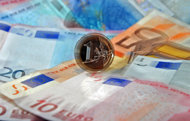EU urges world to aid eurozone via IMF bailout

Eurozone chief Jean-Claude Juncker said after a three-and-a-half-hour conference call that the 17 single-currency countries had pledged 150 billion euros ($195 billion) in new loans for the International Monetary Fund to use in stabilising the debt-laden euro area.
The shortfall from a 200-billion-euro target set on December 9 was in large part caused by Britain's refusal once more to agree to the terms demanded.
Britain's share, based on IMF quotas determined by wealth and size, would be about 30 billion euros.
The IMF currently has some 296 billion euros available for lending to countries that enter reform programmes.
"The EU would welcome G20 members and other financially strong IMF members to support the efforts to safeguard global financial stability by contributing to the increase in IMF resources so as to fill global financing gaps," Juncker said in a statement.
He said the non-eurozone Czech Republic, Denmark, Poland and Sweden had each pledged to make loans, but added that Britain would only "define its contribution early in the new year in the framework of the G20."
However the Czech finance ministry spokesman told the CTK news agency that no decision had yet been taken.
A British government spokesman said: "The UK has always been willing to consider further resources for the IMF, but for its global role and as part of a global agreement."
A diplomat involved in the talks said the 27-nation European Union as a whole "implicitly" agreed to cough up, using individual loans.
The IMF, meanwhile, welcomed the proposed new contributions.
"We welcome the EU finance ministers' support for a substantial increase in the IMF's resources, as we work to strengthen our capacity to fulfill our systemic responsibilities to our global membership."
A key factor will be how the United States responds to pressure to chip in, as the biggest single IMF member economy and a major trading partner of the eurozone. Washington however has its own debt and budget crises to contend with.
Juncker, who spoke of a "special responsibility" for eurozone states, noted that for some countries, notably Germany, parliamentary approval will be required before it will come up with the lion's share.
According to figures coming out of the talks. Germany will provide 41.5 billion euros while France's share, as the second-largest eurozone economy, is 31.4 billion.
Italy is to put up 23.48 billion euros, Spain 14.86 billion, the Netherlands 13.86 billion and Belgium 9.99 billion euros.
The head of the German central bank said last week that it will only do so on condition the very biggest Group of 20 contributors come through with the goods.
Jens Weidmann said that Germany's quota is available, provided there is "fair" burden-sharing among IMF members.
But "if large members, for example the US, were to say 'we're not taking part,' then from our point of view it is problematic," he said.
Russia last week suggested that it could contribute up to $20 billion in loans and investments via the IMF. But China, India and Brazil have yet to go that far.
Finance ministers knew international credit rating agencies were watching closely -- after one of the biggest, Fitch, warned that a meaningful solution may prove "beyond reach" of the EU.
The diplomatic source told AFP that the British government could not sell more money for the eurozone now to increasingly sceptical voters.
Finance minister George Osborne has maintained his position that London will not fund special eurozone aid, since a G20 summit in Cannes in early November.
The latest sign London is out of synch with broader EU goals came 10 days after Prime Minister David Cameron vetoed an EU treaty change and opted out of a pact to create a new "fiscal union."
The EU leaders decided to give the IMF the lead following months struggling to increase their existing, stretched eurozone bailout fund, the 440-billion-euro European Financial Stability Facility (EFSF) set up last year after Greece had to be rescued.
The agreement should offer some respite on the day that European Central Bank chief Mario Draghi described as "morbid speculation" interpretations of an interview in the Financial Times in which he appeared to envisage a eurozone break-up.
In the interview, he said that if countries left the eurozone, they would only "have to undertake the same reforms that were due to begin with, but in a much weaker position."
That was seen as breaching the ultimate taboo, but he insisted: "I have no doubts whatsoever about the strength, the permanence and the irreversibility of the euro."
Nevertheless Wall Street was not impressed, ending the day down 0.84 per cent in thin trade.
What the stars mean:
★ Poor ★ ★ Promising ★★★ Good ★★★★ Very good ★★★★★ Exceptional
 Tag:
Tag:
Related Contents
Latest News
More News
- Russian President congratulates Vietnamese Party leader during phone talks (January 25, 2026 | 09:58)
- Worldwide congratulations underscore confidence in Vietnam’s 14th Party Congress (January 23, 2026 | 09:02)
- Political parties, organisations, int’l friends send congratulations to 14th National Party Congress (January 22, 2026 | 09:33)
- 14th National Party Congress: Japanese media highlight Vietnam’s growth targets (January 21, 2026 | 09:46)
- 14th National Party Congress: Driving force for Vietnam to continue renewal, innovation, breakthroughs (January 21, 2026 | 09:42)
- Vietnam remains spiritual support for progressive forces: Colombian party leader (January 21, 2026 | 08:00)
- Int'l media provides large coverage of 14th National Party Congress's first working day (January 20, 2026 | 09:09)
- Vietnamese firms win top honours at ASEAN Digital Awards (January 16, 2026 | 16:45)
- ASEAN Digital Ministers' Meeting opens in Hanoi (January 15, 2026 | 15:33)
- ASEAN economies move up the global chip value chain (December 09, 2025 | 13:32)






















 Mobile Version
Mobile Version